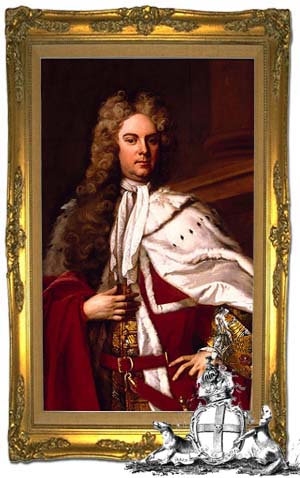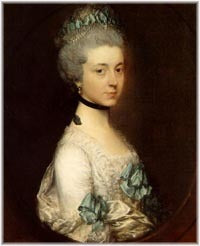Beau Brummell: Nothing but a Name Mysteriously Sparkling

The name Beau Brummell is synonymous with Regency England, but what do you know about him? Researching this article I found that people associate him with silks, satins, and snuff, while one thought he was a fictional detective. It seemed the French writer Barbey d’Aurevilly was right: once the most famous man in the kingdom was “nothing but a name mysteriously sparkling in all the memoirs of his time.” So, what happened to Beau Brummell? George Bryan Brummell was born in 10 Downing Street on 7th June 1778. He was the youngest son of William Brummell - an enterprising man who had risen to the position of Private Secretary to the Prime Minister, with all the influence and trappings that came with the role - a grace and favour apartment in Hampton Court Palace, a country house in Berkshire, and friendship with Charles James Fox, Richard Sheridan, and Sir Joshua Reynolds, who painted the two curly-haired Brummell boys in 1781.
The Brummell family had risen a long way in two generations and young George was to take the family name to even greater heights, and depths. He became a legend in his own lifetime and worked as hard at this as his father had done as a junior clerk. In 1783, William Brummell retired with an income of about £2,500 a year – enough to send his two sons to Eton. There, George was well liked. He was good natured and clever but lazy and already developing his fastidious nature, avoiding the streets in wet weather and careful of his dignity. George went on to Oriel College at Oxford but left in 1794 when his father died, and instead joined the Prince of Wales’ own regiment, the Tenth Dragoons – or ‘The Elegant Extracts’ as they were known. The Dragoons were based in Brighton until civil unrest called them to the north and Brummell resigned immediately, saying that Manchester would be too disagreeable for him. His £40,000 inheritance meant he could afford to concentrate on being a gentleman. Quickly given the soubriquet ‘Beau’, he proved to be a witty and observant figure who made many friends. Charles Stanhope said
“I could understand a good deal of the secret of Brummell’s extraordinary success and influence in the highest society. He was a vast deal more than a mere dandy; he had wit as well as humour and drollery, and the most perfect coolness and self-possession.”To be part of Brummell’s set was Society’s top cachet, and to be cut by him was social death. In the novel Granby there is a poorly disguised portrait.
“In the art of cutting he shone unrivalled. He could assume that calm but wandering gaze which veers, as if unconsciously, round the proscribed individual, neither fixing not to be fixed, not looking on vacancy nor on any one object, neither occupied nor abstracted, a look which perhaps excuses you to the person cut and, at any rate, prevents him from accosting you.”
Brummell was careful to remain free from obligations or attachments (he is said to have cut his own brother) and there were no signs of any relationships – either with women or men. His first biographer, Captain Jesse, thought that Brummell “had too much self love ever to be really in love.” Beau himself told Lady Hester Stanhope that he had adopted the only course possible to distance himself from ordinary men. As Oscar Wilde said more than a century later “to love oneself is the beginning of a life-long romance.”

His friendship with the Prince of Wales did not last. As Brummell ceased to need the Prince’s patronage, so the Prince became jealous of Brummell’s position, but Brummell did not care. “I made him what he is and I can unmake him.” he quipped in an unguarded moment. By 1813 the end of the friendship was scandalously public when the Prince arrived at a party with Lord Alvanley and coldly ignored Brummell.
“Ah, Alvanley,” Brummell’s voice rang out clearly over the shocked silence, “Who is your fat friend?”Brummell maintained his image so well that everyone was shocked when debts forced him to Calais in May 1816. In London, his effects were sold at auction, including his fine cellar “10 dozen Capital Old Port, 16 dozen of Burgundy, Claret, and Still Champagne. . .” They were, the publicity assured potential buyers, “the genuine property of a man of fashion, gone to the continent.” The auction raised £1000, but this was not enough to enable Brummell to return. However, life in Calais was bearable. “No one can lead a more pleasant life than Brummell, for he passes his time between London and Paris” the British ambassador quipped, and Brummell’s friends visited him there, bring presents of money or gifts such as his favourite Façon de Paris snuff. In 1818 rumours abounded that he had been offered £5 thousand to write his memoirs, and that the Prince of Wales had offered £6 thousand for him not to do it. Brummell became very popular in Calais “We used to call him Le Roi de Calais. He was a truly fine man, very elegant, and really well off – he always paid his bills and was very good to the poor; everyone was very sorry when he left.” said a Calais shopkeeper. Brummell was always careful to settle his debts with tradesmen – instead he owed increasingly vast amounts of money to bankers and his friends but his good nature and wit charmed them all.
When asked to make a contribution towards a Church of England chapel in Calais, he replied “I am very sorry you did not call last week, for it was only yesterday that I became a catholic.”
In 1827 Brummell’s patron the Duke of York died, and Brummell’s creditors began to close in. That summer, Brummell’s letters contained a note of panic. “I am sadly alarmed lest some overwhelming disaster should befall me” he wrote. While George IV was king, there was little hope of rapprochement, but good fortune did come along in June 1830 when Brummell was appointed His Majesty’s Consul for the departments of Calvados, La Manche, and Ille et Vilaine. The post was paid £400 a year and was based in Caen. However, there was a problem; with more than £1000 of debts, Brummell’s creditors were very reluctant to see him leave Calais. It was not until he signed a crippling agreement to assign his salary to his attorneys to deal with his debts that he was allowed to leave. In Caen, he soon became a popular figure, noted for the way he would tiptoe across the cobbles to avoid getting dirt on his boots. He struck up a friendship with the grocer and wine merchant Charles Armstrong, who also cashed bills and money orders. Money remained a problem and he continued to press for a superior job; he wrote to Lord Palmerston that the post at Caen was not needed and he (Brummell) could do something better. On the 21st March 1832 he received a reply: HM Govt had “come to the conclusion that the post of British Consul at Caen may be abolished without prejudice to the public service . . . your salary will cease on the 31st May.” The news did not stay secret for long and he only escaped from the bailiffs when his landlady hid him in a wardrobe. Armstrong went to England to collect money from Brummell’s friends and arranged £120 a year for his keep. Although generous, this was a pittance which at one time he would have spent in less than a month – when asked how much it would cost to launch a young man into London society, he once replied “with strict economy, it might be done for eight hundred pounds a year.”
His situation began to tell upon his mind, “I am incompetent to do anything but to ruminate over the broken toys of my past days” he mourned to his landlady’s daughter. That summer, the stress and worry probably contributed to his first stroke, and he moved to smaller lodgings at L’ Hotel d’Angleterre where, in April 1834, he had his second stroke whilst dining. Recovery was slow this time and he became dogged with a sense of his own mortality: “they are weaving a shroud about me; still I trust I shall yet escape” he wrote. A third stroke ended that year and the following May he was arrested for debt and taken to gaol where he shared a stone cell with three others. He had not been allowed to dress properly before his arrest and the degradation bewildered him.
“Image a position more wretched than mine! They have put me with all the common people! I am surrounded by the greatest villains and have nothing but prison fare!”
Once again, his remarkable friends rallied round and although they could not raise enough to secure his release, they paid for him to share the private room of political prisoner, Charles Godefroy. Armstrong arranged food, laundry, and sent in his washing basin so that he could perform his famous toilette – to Godefroy’s amazement. Armstrong also looked after his property and went to Calais and London to raise a fund for him. This time, Lord Palmerston agreed to £200 in recognition of the severance of the Caen contract, and once again his friends contributed, including £100 from King William IV. Brummell was released on the 21st July 1835, and Armstrong made it clear that he would not honour any debts run up without his knowledge. The fastidious Beau was reduced to wearing cast-off clothes and a black silk cravat instead of white linen to save on the washing. When his trousers needed mending, he stayed in bed because they were his only pair. Brummell’s tragedy was that he outlived his time. His fairy-tale had ended twenty years before and now the new young Queen was ushering in the Victorian era while his friends were themselves passing into shadows. As his illness grew, the former dandy neglected his cleanliness and threw fantasy parties for friends who were long dead. In 1839, he was taken to the asylum of the Bon Saveur – shrieking they were putting him into prison but where his last months were peaceful and he died in his bed on 30th March 1840. The legendary Beau Brummell lies in a plain grave in Calais, unnoticed and forgotten, the name more glittering and the man more elusive with each passing year.
Further reading:
Kelly, I (2006) Beau Brummell, the Ultimate Dandy. Free Press.
Barbey d’Aurevilly J (1845) Du Dandysme et de George Brummell.
Cole H (1977) Beau Brummell. Granada: London
Lister T H (1826) Granby. A Novel in three volumes. Colburn: London.
Muers E (1963) The Dandy. Secker & Warburg: London.
This article, by Joanna Brown, was copied by permission of Jane Austen's Regency World. To learn more about this magazine, the only full color magazine devoted to Jane Austen, or to subscribe, visit their website: www.worldmags.com



Leave a comment
This site is protected by hCaptcha and the hCaptcha Privacy Policy and Terms of Service apply.